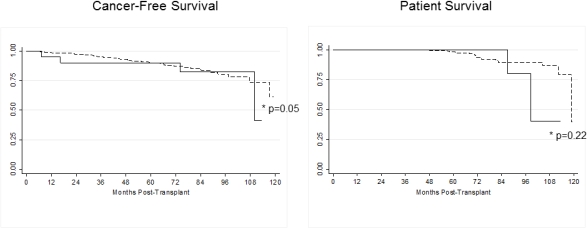Sirolimus Use Improves Cancer-Free Survival Following Transplantation: A Single Center 10-Year Analysis
1Surgery, Section of Transplantation, Albany Medical College, Albany, NY
2Surgery, Albany Medical College, Albany, NY.
Meeting: 2018 American Transplant Congress
Abstract number: C81
Keywords: Malignancy, Post-transplant lymphoproliferative disorder (PTLD), Rapamycin, Sirolimus (SLR)
Session Information
Session Name: Poster Session C: Kidney Immunosuppression: Novel Regimens and Drug Minimization
Session Type: Poster Session
Date: Monday, June 4, 2018
Session Time: 6:00pm-7:00pm
 Presentation Time: 6:00pm-7:00pm
Presentation Time: 6:00pm-7:00pm
Location: Hall 4EF
Introduction:
In previous published results, we showed that the use of Sirolimus-based immunosuppression regimens had equivalent patient and graft 10-year survival compared to historical controls maintained of steroid-based regimens. Additionally, the development of diabetes, hypertension, hypercholesterolemia and coronary artery disease were significantly improved. Sirolimus has been shown to have significant anti-tumor activity in addition to being a powerful immunosuppressant. In this study, we determined the effects of chronic Sirolimus-based immunosuppression regimens on the development of malignancy 10 years-post transplantation.
Methods:
From 2003 to 2013, 563 kidney transplant recipients were maintained on immunosuppression regimens consisting of Tacrolimus, Mycophenolate Mofetil, and Sirolimus. We compared rates of new cancer diagnoses, as well as cancer-related outcomes with 65 historical controls maintained on steroids without Sirolimus.
Results:
There were no differences in the demographic composition of the two study groups including rates of pre-transplant malignancy. Post-Transplant, while there were no differences in the rates of Skin, Beast, Urothelial, Cervical, and Prostate cancers; rates of PTLD were higher in the patient population not maintained on Sirolimus (5.88% vs. 0.5%, p=<0.05). Additionally, Cancer-related mortality was higher in the patient populations not maintained on Sirolimus (2.94% vs. 0.025%; p=0.01). There was also a trend towards earlier cancer diagnoses in Sirolimus-based cohorts compared to controls. Finally, Kaplan-Meier survival curves showed that while 10-year overall patient survival was equivalent across both groups (p=0.22), there was a significant difference in Cancer-Free survival 9-10 years following transplantation (p=0.05).
Conclusions:
Long-term Sirolimus use results in similar patient and graft survival over steroid-based regimens and appears to improve long-term cancer-free survival. Sirolimus-based immunosuppression regimens may be a good alternative to more commonly used immune suppressants.
CITATION INFORMATION: Chen P., Nair L., Ata A., Conti D., Lopez-Soler R. Sirolimus Use Improves Cancer-Free Survival Following Transplantation: A Single Center 10-Year Analysis Am J Transplant. 2017;17 (suppl 3).
To cite this abstract in AMA style:
Chen P, Nair L, Ata A, Conti D, Lopez-Soler R. Sirolimus Use Improves Cancer-Free Survival Following Transplantation: A Single Center 10-Year Analysis [abstract]. https://atcmeetingabstracts.com/abstract/sirolimus-use-improves-cancer-free-survival-following-transplantation-a-single-center-10-year-analysis/. Accessed March 1, 2026.« Back to 2018 American Transplant Congress
